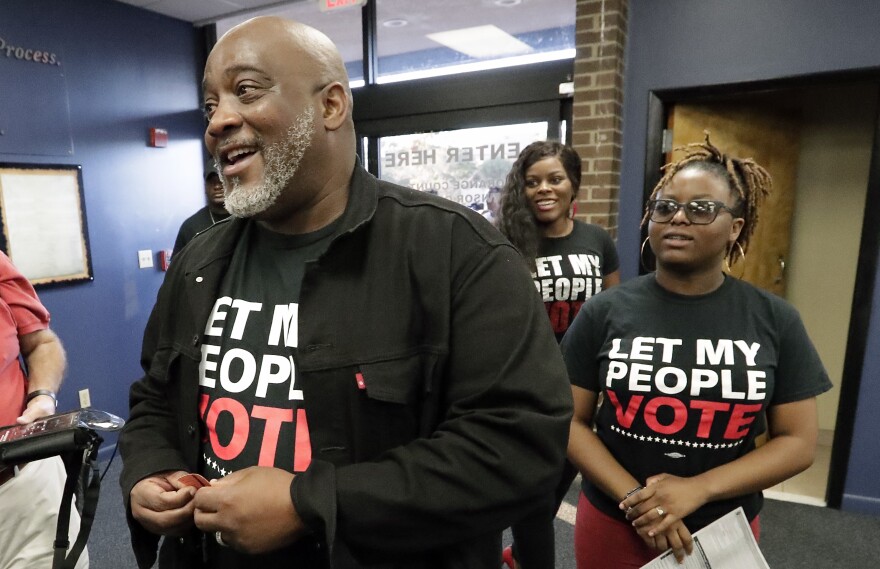The Florida Cabinet voted this month to revamp the restrictive rules on restoring civil rights for people with felony conviction that were put in place by former Gov. Rick Scott 10 years ago.
The move could affect the civil rights of hundreds of thousands of Floridians.
Desmond Meade is the executive director of the Florida Rights Restoration Coalition, or FRRC, a group that had been pushing for the changes for years.
“It’s huge,” Meade told a statewide meeting of the group last week.
Meade’s group was instrumental in convincing Floridians to pass Amendment 4 in 2018. That ballot initiative made it so that voting rights would automatically be restored once someone completes all the terms of their sentence, with the exception of charges for murder and some sexual crimes.
More than 100,000 Floridians with felony convictions are now registered to vote in the state, Meade estimated. All of those people will soon be able to register to get back their other civil rights, such as the right to run for elected office and serve on a jury.
“The process was archaic, it was arbitrary, it was so much that was wrong with it,” said Meade of the rules that were overturned, which were created by former Gov. Scott and the Florida Cabinet in 2011.
Under those previous rules, people with felony convictions would have to wait a minimum of five years after completing their sentence in order to ask for their rights back. And in most cases, the person applying to have their civil rights restored would have to go before the Cabinet and plead their case in person.
Many were turned down with little to no explanation. DeSantis and the Cabinet put an end to the waiting period, changing the process so someone would be able to get their rights back as soon as they are done with their sentence.
Also, by predicating other civil rights to those who have already regained the right to vote under Amendment 4, no in-person hearing will be necessary for those cases. Meeting the requirements to get voting rights restored essentially pre-clears someone for their other rights.
Those with a felony conviction who are eligible to vote will have to fill out a form in order to benefit from the new rules. The form has not yet been released by the state, but the Florida Rights Restoration Coalition is already setting up statewide infrastructure to help people gather documents and help with the process.
“We are actually ahead of the government right now in terms of looking through these new plans and proposals and trying to figure out how to help people get plugged into that,” said FRRC deputy director Neil Volz. “As they move, we’re gonna move.”
Florida Agriculture Commissioner Nikki Fried, the lone Democrat in the Cabinet, had been pushing for this kind of rule change since she came into office in January 2019.
Those calls fell on deaf ears prior to the 2020 presidential election. After the election, the tune of the fellow Cabinet members changed.
“This is something that has been a topic in my office since I got here. I thought these rules needed to be changed,” Attorney General Ashley Moody said in the Cabinet meeting where the rule change took place. “I think the rules are a great first step to reducing our backlog.”
The state currently has a backlog of more than 24,000 clemency cases that are pending review. Some people have been waiting for more than a decade to have their cases looked at.
“I believe that those who have had their voting rights restored under Amendment 4, it makes sense to also restore their other civil rights,” said Gov. DeSantis at the meeting.
Fried expressed concern that only people who have paid all of their fines, fees and restitution will be able to get their civil rights back through the new process.
“What about the vast majority who can’t afford the fines, fees, court costs and money that is owed to the government?” she asked at the meeting.
Her argument echoed a prolonged legal battle over a 2019 state law that interpreted that only people who paid all of those financial obligations should regain their voting rights under Amendment 4. The state lost that court case in a U.S. District Court, but it was overturned on appeal.
Former Gov. Charlie Crist, a Republican at the time, also required people to have paid off all of their fines, fees and restitution when he created a similar automatic rights restoration process in 2007. But his process only applied to people who had convictions of certain felony classes. Nevertheless, over the next four years, more than 155,000 Floridians got their civil rights back.
The new rule just adopted by DeSantis and the Cabinet is much broader than Crist’s old process, in that it includes people of all classes of felony convictions, with the exception of murder and certain sexual crimes.
For Meade, the rule changes mark a major victory, and a recognition of the power of a growing potential voting bloc in Florida politics.
“The governor and the Cabinet did not just decide to budge an inch out of the kindness of their heart — I don’t think so,” said Meade. “I do believe that at least some of the reason why we see this change is because folks are recognizing that there is a new constituency group that’s growing.”
Copyright 2021 WLRN 91.3 FM. To see more, visit WLRN 91.3 FM.




